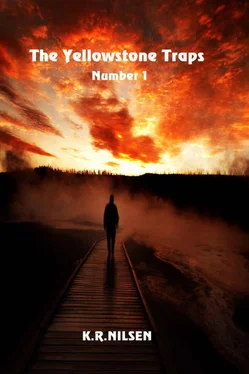“May I come to dinner, too?”
“You’re the master of ceremonies, you middle-aged fool.”
“Easy, Penny.”
The lady chuckled. “All of it, with the exception of most of the wheat in the biscuit, a few spices and the lentils, we grow right here.”
“Perfect. What’s for tomorrow night, bread and water?”
“I told you I’d hit you with a skillet!”
Abel smiled and ate more of his breakfast. “Do you have everything you need here, Penny?”
“Yes, all organized. The troops will rally here in an hour. We’ll have all the ingredients we need by noon. Registration is over forty-something people this round, right?”
“Forty-eight. Full house. We even have a guest booked for one two-week session and another double this winter. She’s going to take a whole raft of seminars.”
“That’s wonderful. Where is she from?”
“Ah, let me think. Kansas City, I believe.”
“Have we ever had someone come for four weeks?”
“No, not that I recall. I think it’s a first, Penny.”
“We’ll have to make her a special award if she does all four weeks.”
“Mmm, that’s a good idea.”
Ablister of superheated rock plasma, three miles deep in the earth’s crust, beneath the south rim of Yellowstone’s ancient and long-buried Lava Creek caldera, was busy consuming the rock ceiling above. For several centuries, the blister had been adding degree upon degree of Fahrenheit, a bubble of white-hot purgatory at the edge of a monstrous reservoir of roiling magma that had been expanding and stretching and flexing its aged muscles for thousands of centuries.
Scientists throughout the West were very much aware of and at ease with the constant low-magnitude earthquake swarms that emanated from Yellowstone on a continuous basis, most of them rumbling beneath the threshold of human senses. The seismic chatter recorded from Canada to Mexico and from Chicago to California had been swinging the ink plotters on seismographs as long as the instruments had been employed in the field. The swarms were background noise generated by the slow inflation and deflation of the vast magma sea below almost the entire length and breadth of Yellowstone, a cauldron that powered all the park’s famous geysers and hot springs. The seismic noise was something geologists and earthquake researchers were very comfortable with; in fact, they regarded the swarms as normal Yellowstone behavior.
At 12:47 a.m., Liz scrawled in longhand in a field notebook propped on her knees. She sat tilted back in a chair, legs up, feet planted squarely on the edge of a desk. There she teetered, writing, absorbed in the task of getting the last thoughts about her first full day’s work on the lake down in her journal.
Away to the north, a crustal roof atop the magma chamber, nearly ninety square miles in size and centered below Frank Island in the lake, buckled and slumped along an ancient fault line, pulling the lands above downward fourteen inches. The collapse displaced millions of tons of hot plasma. Vast volumes of the plastic magma lurched to the east, rifling shock waves through the rock strata above. The energy release tripped a long-dead slip fault that sliced along the four-mile west inlet near Plover Point, ran under the lake and exited the park to the northeast. The lands on either side of the fault sheared up, then down, spiking with seismic frenzy. East of the collapse, the land lurched upward, driven by the titanic forces moving beneath. In the vicinity of Yellowstone Lake, the forests tilted southeast and downward a fraction of a degree.
Racing outward from the epicenter at jetliner speed, the wave shocks found in seconds the stone and mortar foundations of the research cabin where Liz sat writing, a mile south of Plover Point. The seismic waves turned every fiber of wood in the little building into symphonic instruments in the hands of lunatics. The beams, ceilings, walls and floors screeched, drummed, whistled, hooted and howled as the cabin vibrated violently. Pitched back on just two legs of the chair, Liz lost her balance and tipped backward, landing with a bone-rattling crash on floorboards thumping with newfound seismic energy.
In an instant, responding to her mind’s hardwired flight response, the geophysicist rolled to her knees. Pushing off with her toes, she crab-crawled as fast as her body could muster across the main room and out into the moonlight. The woman dove off the cabin steps and plunged her fingers deep into the soil as if trying to stabilize the earth itself.
Forty-six seconds into the tremor, the land exhaled and lay still. Liz was spat out of the vortex of noise and convulsion into a catatonic silence. It took her long moments to loosen her grip on the earth at her fingertips. She rocked back on her knees and sat on her rump.
“Whew,” she uttered slowly into the night chill. “That was something.”
For a moment, nothing audible infiltrated the night. Then something—a hushed tone. Liz’s ears captured muted waves of sound at the edge of human hearing, akin to the purr of steam issuing quietly from an old radiator. The volume of the noise increased, swelling, marching toward her.
“Oh, my God!” the geophysicist croaked. She whirled about looking for anything to climb, but the trees stood limbless up dozens of feet in the air. Frantically, she bolted for the porch of the small building she had just rolled away from. She leaped onto the porch, sprinted through the main room and scrambled onto the upper bunk of one of the double bunks affixed to a wall.
As the scientist threw herself onto the bunk, the structure shuddered. White foam, reflecting the dim night photons, washed into the room, a foot over the floorboards. The froth sloshed against the back wall and again the cabin shook. Now the room gurgled and bubbled as if the place were caught in the drain of an old clawfoot bathtub.
Within minutes, the room drained its burden of water. Liz climbed down off the bunk, rushed through the main room again and out onto the porch. Instead of grasses and low forest growth before her, a shallow sheet of black water was running, slipping west. As she watched, the fluid from a freshwater, tsunami-like seiche wave became shallower, slowed its forward motion and stopped. Imperceptibly at first, the wet reversed direction and began to recede to the northeast, back to the lake.
Data research analyst Winifred Deschaines finished work on a lengthy report for a dossier a few minutes before midnight. The 90-page document, she felt, could just about stand on its own. The subject of her writing, Abel Whittemore, could be seen for what he was, an anti-mass culture utopian with a gift for getting his message out to a small but explosively growing legion of the disenchanted. That consumers across the country were buying up his books in ever-escalating numbers had finally, after nearly a decade, brought him to the attention of federal authorities.
Winnie scanned her material in the confines of what she called the Florida room at her home in Parkville, Missouri, a hilly northern suburb of Kansas City hard by the banks of the Missouri River. Sitting bolt upright in silk nightwear, Winnie keyed the finishing touches on the draft. On a side table beneath a window, the detritus of her work on Whittemore lay in haphazard piles, but there was one item she kept by her computer, Whittemore’s recent best-selling book, Independency . She found herself picking up the tome almost daily and rereading a passage or a chapter.
The thirty-five-year-old information technology professional poured a dram of Courvoisier XO cognac. It was so pricey, but she bought a few bottles a year and treated herself to a nip now and again. She could relax a little now that she had completed the lion’s share of the draft for her contractor, Midlands Research Group Inc. Midlands was a firm that specialized in collecting and analyzing hard and digital information left in the wake of fringe political and religious organizations and specious manufacturing, service and financial enterprises. Scores of clients contracted with Midlands, but its cash-cow contracts were those tendered by a host of federal agencies outsourcing data collection. Winnie specialized in sniffing out the digital trail left by suspected domestic terrorist cells, hate groups and rogue citizen militias. Midlands coveted her skills and knocked on her door often.
Читать дальше










